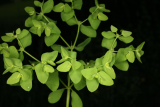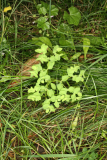Additional notes (click to expand)
Commemorative
The genus is named for Euphorbus (fl. circa 10 BC – AD 20), the Greek physician to the Berber king Juba II (c. 50 BC – AD 23) of Numidia, a country which once existed within modern Tunisia and Algeria. He was the brother of Antonio Musa (vide Musa), physician to Caesar Augustus. The king married Cleopatra Selene, the daughter of Mark Anthony and Cleopatra, and later, Glaphyra, the widow of the son of Herod the Great. The king was interested in plants and, according to Pliny the
Elder (Pliny, AD 79), gave it its name in 12 BC. In the 16th century it was known as Tithymalus, but
Linnaeus restored the name Euphorbia in 1753. One story is that Euphorbus cured King Juba from
a stomach condition with a Euphorbia. The other is that the plant was discovered by the king in
the Atlas mountains of Morocco and that, as Euphorbus was a fat man and the plant was fleshy, he thought it an apt name as ‘euphorbus’ in Greek means ‘eu = good’ and ‘phorbe = fodder’. Juba is remembered elsewhere, for he gives his name to the capital of the new country of South Sudan. Euphorbia regis-jubae, discovered on an expedition to the Canary Islands, sponsored by King Juba, also commemorates him.
Medicinal
Used to treat basal cell carcinomas in Australian trial. Source for synthesising Ingenol mebutamate for actinic keratoses.
Toxicity
Toxic due to highly irritant saponins in sap (‘Latex’)
Professor Anthony Dayan, 2022
Geographical distribution
- Africa, Macaronesia, Canary Is.
- Africa, Macaronesia, Madeira
- Africa, Northeast Tropical Africa, Ethiopia
- Africa, Northeast Tropical Africa, Somalia
- Africa, Northern Africa, Algeria
- Africa, Northern Africa, Egypt
- Africa, Northern Africa, Libya
- Africa, Northern Africa, Morocco
- Africa, Northern Africa, Tunisia
- Asia-Temperate, Arabian Peninsula, Gulf States
- Asia-Temperate, Arabian Peninsula, Kuwait
- Asia-Temperate, Arabian Peninsula, Saudi Arabia
- Asia-Temperate, Arabian Peninsula, Yemen
- Asia-Temperate, Caucasus, Transcaucasus
- Asia-Temperate, China
- Asia-Temperate, Eastern Asia, Taiwan
- Asia-Temperate, Western Asia, Cyprus
- Asia-Temperate, Western Asia, Iran
- Asia-Temperate, Western Asia, Iraq
- Asia-Temperate, Western Asia, Israel
- Asia-Temperate, Western Asia, Lebanon-Syria
- Asia-Temperate, Western Asia, Turkey
- Asia-Tropical, Indian Subcontinent, India
- Asia-Tropical, Indian Subcontinent, Pakistan
- Europe, Eastern Europe
- Europe, Middle Europe
- Europe, Northern Europe
- Europe, Northern Europe, Great Britain
- Europe, Northern Europe, Ireland
- Europe, Southeastern Europe
- Europe, Southwestern Europe
Euphorbia peplus L.
Family: EUPHORBIACEAEGenus: Euphorbia
Species: peplus L.
Common names: Petty spurge; Radium weed; Cancer weed; Milkweed
Distribution summary: Europe, Temperate Asia
Habit: Annual
Hardiness: H3 - Half hardy; unheated greenhouse/mild winter
Habitat: Scrub and waste land
Garden status: Currently grown
Garden location: Plane tree bed (P)
Flowering months: April, May, June, July, August
Reason for growing: Medicinal, toxic, prescription only medicine



.JPG)